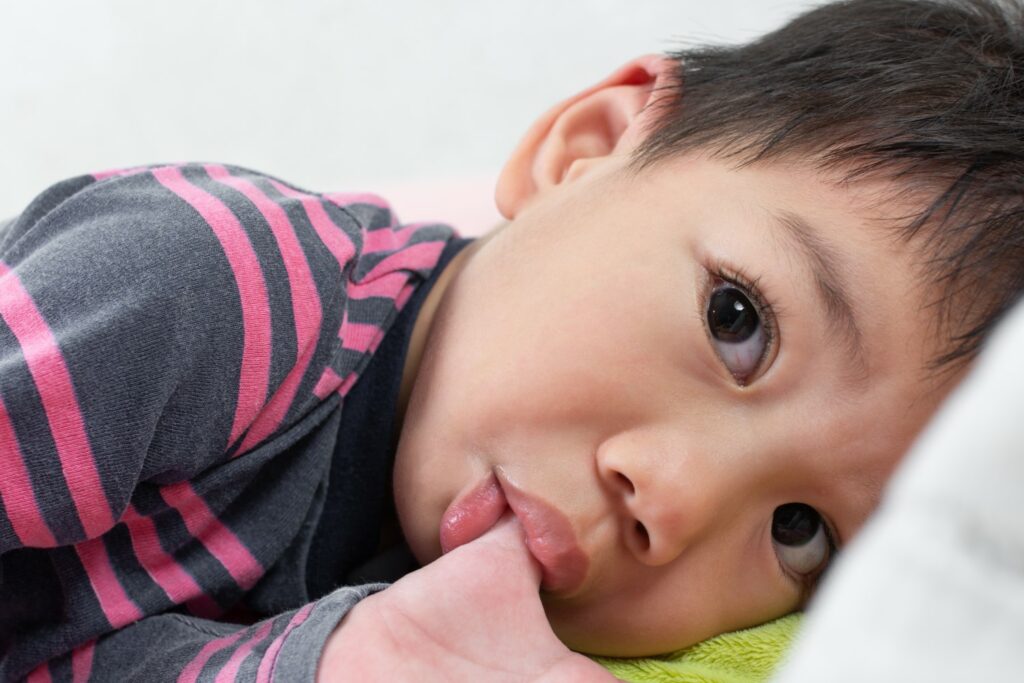As babies grow and develop into adorable toddling tots, they’re constantly learning about and exploring their surroundings, which can be a bit overwhelming at times. The world can be a scary place for kids and adults alike, and for a child taking in everything for the first time, sometimes it’s a lot to manage. They just want to feel calm and soothed again.
Even while still in the womb, babies are often seen sucking their thumbs through the ultrasound screen! Infants are born with the instinctual need and know-how to suck; it’s one of the first things they do when they enter this world.
For many children, their thumb is an important source of comfort: always there when they need a quick fix. But is there an age at which children should be stopped from sucking their thumb? How can parents help prevent children from making it a chronic habit past their first few years?
When Should Children Stop Sucking Their Thumb?
Between the ages of two and four years old, most children will stop sucking their thumb, due to interest in other activities, peer pressure, or a mix of both.
If your child is still sucking their thumb past the age of three or four, it’s recommended that you intervene and help them break the habit.
What’s the Harm in Thumb Sucking?
While thumb sucking can be very beneficial for your child’s emotional health and ability to self-sooth, it can create big issues for their permanent teeth and possibly their baby teeth, too.
According to the American Dental Association, prolonged thumb sucking may cause problems not only with the growth and alignment of teeth, but also with the roof of their mouth. Speech problems have also been associated with these issues.
Aggressive vs. Passive Thumb Sucking
Before you get too terribly worried about your child’s habit though, consider the type of thumb sucking that they tend to do.
Do you hear a popping sound when they release their thumb from their mouth? If so, it’s likely that they’re sucking fairly aggressively, thus potentially causing significant damage to their mouth over time.
On the other hand, if your child tends to just rest their thumb passively in their mouth, this is much less likely to cause long-term damage.
Thumb Sucking vs. Pacifier Usage
What about pacifiers? Is it better to allow a pacifier instead of thumb sucking?
Pacifiers are not a failsafe alternative to thumb sucking, but they do offer some key benefits:
1. Easier habit to break.
When your child is accustomed to self-soothing with a pacifier, you can more easily monitor and mediate this situation. It’s a tangible object that can be presented – or removed – at the appropriate time, such as naptime or bedtime, whereas a thumb is ever present. Furthermore, with thumb sucking, a child may not even realize they’re doing it, hence making the habit even more difficult to kick.
2. Size of pacifier remains constant, hence less overall potential damage.
As a child grows, their thumbs grow, too. If your child is sucking their thumb or other digits past the age of three or four, consider the size difference of their hands from infancy to this age. While pacifiers come in various shapes and sizes, the overall size remains relatively consistent and is made for the mouth, as opposed to the finger or thumb of a four-year-old child.
3. Cleaner object in the mouth.
Consider all the items your child is touching throughout the day: playground equipment, shared toys, the floor, animals, etc. While a pacifier is not necessarily clean at all times, it’s generally a bit more likely to be clean than your child’s thumb. Plus, it’s a little easier to clean than your squirmy toddler’s hands, so it’s another aspect you can more easily monitor and control.
While the above alternatives indicate that using a pacifier is preferable to thumb sucking, please note that prolonged pacifier usage still has the same drawbacks as thumb sucking in terms of potential teeth misalignment.
When using a pacifier, it’s imperative that parents and caregivers never use sweeteners, such as sugar or honey, on a pacifier to encourage its usage. Babies under one year shouldn’t have honey to begin with, and sugar, in general, is not recommended for small children either. Instead, use positive reinforcement and just keep correcting the behavior for as long as needed.
How Do I Help My Child Wean Off of Thumb Sucking?
Thumb sucking and pacifier usage is a very common, normal habit for children two and younger. However, between the ages of two and three, it’s in your child’s best interest to start helping them wean off of this practice.
How to Wean Your Child Off of Thumb Sucking:
- Parental Reflection:
The first step is to reflect upon the timing of your child’s habit; are there specific activities that seem to trigger their need for thumb sucking? Often, children will self-soothe during stressful situations, or when they’re bored, tired, or hungry.- If there is a social situation or other activity that seems to trigger your child to suck their thumb outside of the aforementioned moods, be sure to address these concerns with your child and speak to their pediatrician if needed, as their actions may point to a larger source of anxiety.
- If your child seems to be passively thumb sucking as more of a habit than as a method of self-soothing, this is a bit simpler of an issue to solve. For example, during play time, try to redirect them such that they are using both hands for the activity, thereby not having a thumb available for their mouth.
- Parent-Child Conference: Keeping in mind the age and personality of your child, explain to them the importance of ceasing their thumb sucking habit. The journey will be a lot more pleasant for all involved if your child is even remotely on board with the idea.
- “You catch more flies with honey” is a truthful cliché – use positive reinforcement rather than punishments or ridicule.
- Give gentle reminders and try to stay patient and calm throughout the process. Remember, your child has likely been sucking their thumb since they were as young as 12 weeks of age! So, it’s a pretty big deal for them to quit now. Encourage them accordingly!
- Consider easing into the weaning process rather than cutting the habit cold turkey. Perhaps your child would feel more comfortable by beginning with only sucking their thumb at naptime or bedtime.
- Come up with a plan together: There are many ways you can approach the process of weaning your child from thumb sucking. Some suggest bad-tasting nail polish as a deterrent, others say to put a Band-Aid on their favorite finger, the list goes on.
However, for the best outcome, your child needs to buy in and be intrinsically motivated, otherwise they’re likely to run off and do it in secret any chance they get. So, what can you do to motivate them?
- Create a sticker chart with a reward for improvement and/or success.
Stopthumbsucking.org suggests the following, “Create a 30-day program with your child; create a motivational system with positive reinforcement and small rewards for incremental success – you will need a calendar. Stickers work great for tracking progress. They must be able to visually see the progress and them making progress towards the end goal. Their goal will be more about the reward than overcoming the challenge. Let your child select a $5-$10 item (or activity) they want as a reward and keep reminding them they are getting closer to the reward and show progress on the chart.” - Read books that encourage kids to stop sucking their thumb. A few favorites are Anna and Dedo, by Martina Gisler and David Decides About Thumbsucking, by Susan Heitler.
- Be their cheerleader, not a bully: Be sure to keep in mind the tone and words you use when talking to your child about sucking their thumb. Keep it team-focused, rather than a me-vs.-you attitude. Let your child know you’re on their side and you want them to succeed.
- Create a sticker chart with a reward for improvement and/or success.
Schedule an Appointment with Jenkins Dentistry for Kids
Being a parent is hard work; there are so many things to consider when it comes to caring for your child: dental care, proper nutrition, emotional health, sufficient physical activity, intellectual stimulation, and everything in between.
At Jenkins Dentistry for Kids, we take pride in caring for your child’s oral health, and we make it a fun experience for them, too!
Has your child’s first tooth erupted? If so, your child is eligible for their very first dental visit! We look forward to meeting you. Schedule an appointment today!

